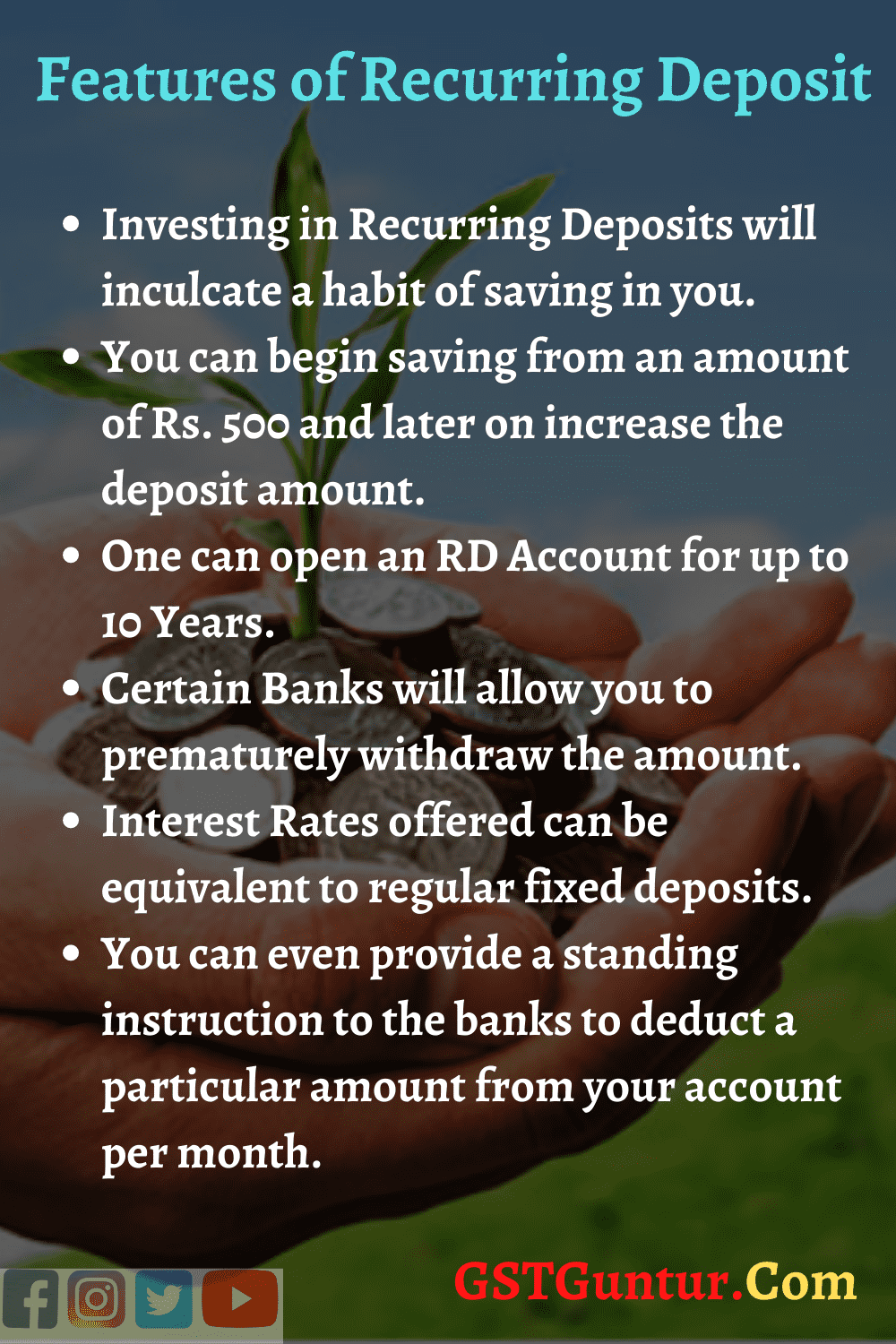If you wish to make a risk-free investment you can choose a Recurring Deposit. RDs have greater flexibility than Fixed Deposits and can be great for those who have a regular income and who are unable to make a huge investment at one go. Recurring Deposit Interest Rates offered are highly competitive among banks. Go through the further articles to be aware of details like Best RD Rates Comparison, How to Calculate Interest Rates on a Recurring Deposit Scheme, Types of Recurring Deposit, Factors that affect the Recurring Deposit, etc.
RD Interest Rates Overview
| Particulars | Details |
| Interest Rate Range | 2.50% to 8.50% |
| Minimum Deposit Amount | Starts from Rs. 10 (for post office RD) |
| Tenure of the Investment | 6 months to 10 years |
| Interest Compound Frequency | Quarterly |
| Partial and Midterm Withdrawal | Not Allowed |
| Premature Closure | Allowed with penalty |
Best RD Interest Rates Comparison as of 26th Nov 2021
| Bank | RD Interest Rates (General Public) | Senior Citizen RD Rates |
|---|---|---|
| HDFC RD Interest Rates | 4.40% to 5.50% | 4.90% to 6.25% |
| ICICI RD Interest Rates | 3.50% to 5.50% | 4.00% to 6.30% |
| SBI RD Interest Rates | 4.40% to 5.40% | 4.90% to 6.20% |
| Allahabad Bank RD Interest Rates | 6.25% – 6.45% p.a. | 6.25% – 6.45% p.a. |
| Andhra Bank RD Interest Rates (now Indian Bank) | 4.40% to 5.15% | 4.90% to 5.65% |
| Axis Bank RD Interest Rates | 4.40% to 5.75% | 4.65% to 6.50% |
| Bandhan Bank RD Interest Rates | 4.50% to 5.00% | 5.25% to 5.75% |
| Bank of Baroda RD Interest Rates | 4.30% to 5.10% | 4.80% to 5.60% |
| Bank of India RD Interest Rates | 4.35% to 5.05% | 4.85% to 5.55% |
| Bank of Maharashtra RD Interest Rates | 4.00% to 4.90% | 4.50% to 5.40% |
| Canara Bank RD Interest Rates | 4.40% to 5.25% | 4.90% to 5.75% |
| Central Bank of India RD Interest Rates | 4.25% to 5.00% | NA |
| Citibank RD Interest Rates | 2.75% to 3.00% | 3.20% to 4.00% |
| City Union Bank RD Interest Rates | 3.75% to 5.00% | 3.75% to 5.00% |
| Corporation Bank RD Interest Rates (now Union Bank of India) | 4.40% to 5.60% | NA |
| DBS Bank RD Interest Rates | 3.00% to 5.50% | NA |
| Deutsche Bank RD Interest Rates | 3.65% to 6.25% | 3.65% to 6.25% |
| Dhanalakshmi Bank RD Interest Rates | 4.25% to 5.50% | 4.75% to 6.00% |
| Federal Bank RD Interest Rates | 4.00% to 5.60% | 4.50% to 6.25% |
| IDBI Bank RD Interest Rates | 4.30% to 5.40% | 4.80% to 5.90% |
| Indian Bank RD Interest Rates | 6.25% – 6.30% p.a. | 6.75% – 6.80% p.a. |
| Indian Overseas Bank RD Interest Rates | 4.90% to 5.20% | 5.40% to 5.7% |
| IndusInd Bank RD Interest Rates | 4.60% to 5.560% | 5.10% to 6.00% |
| Jammu and Kashmir Bank RD Interest Rates | 4.50% to 5.30% | 5.00% to 5.70% |
| Karnataka Bank RD Interest Rates | 5.10% to 5.60% | 5.60% to 6.20% |
| Karur Vysya Bank RD Interest Rates | 4.00% to 5.75% | NA |
| Kotak Mahindra Bank RD Interest Rates | 4.30% to 5.25% | 4.80% to 5.75% |
| Lakshmi Vilas Bank RD Interest Rates | 3.00% to 5.50% | NA |
| Oriental Bank of Commerce RD Interest Rates | 6.25% p.a. | 6.25% p.a. |
| Post Office RD Rate | 5.80% | 5.80% |
| Punjab National Bank RD Interest Rates | 4.40% to 5.25% | 4.90% to 5.75% |
| Saraswat Bank RD Interest Rates | 5.10% to 5.85% | 5.10% to 6.35% |
| South Indian Bank RD Interest Rates | 4.10% to 5.65% | 4.00% to 6.15% |
| Syndicate Bank RD Interest Rates | 4.40% to 5.25% | 4.90% to 5.75% |
| TMB RD Interest Rates | 5.00% to 5.25% | 5.00% to 5.75% |
| UCO Bank RD Interest Rates | 4.70% to 5.00% | 4.95% to 5.00% |
| Union Bank of India RD Interest Rates | 4.40% to 5.60% | NA |
| United Bank of India RD Interest Rates (now Punjab National Bank) | 4.40% to 5.25% | 4.90% to 5.75% |
| Yes Bank RD Interest Rates | 5.00% to 6.50% | 5.50% to 7.25% |
*Note: The Recurring Deposit Interest Rates Comparison mentioned here are as of 26th Nov 2021. Go through the terms and conditions before applying for one.*
Types of Recurring Deposit Interest Rates
Recurring Deposit Interest Rates are of various types. Go through them below and have an idea on which one to choose as per your interest. They are as follows
Regular Savings Scheme: Banks provide recurring deposits to citizens above the age of 18 years. You can choose a certain sum of money for a period of 6 months to 10 years. Interest can be found on simple interest or compound interest basis. After the completion of the tenure, you can withdraw the entire amount. Interest Rates for regular savings range from 4-6.5%
Junior RD Schemes: Banks provide recurring deposits for kids too. Parents or Guardians can open these schemes to safeguard their kids’ future. Interest Rates earned from these schemes will be equal to regular RD Schemes or even greater than that.
Senior Citizens RD Schemes: Banks usually offer higher rates of interest for senior citizens. Per Annum 0.5% interest is given to the existing interest rate. Interest Rate ranges between 4-7.25%. Several Schemes are available for Senior Citizens at their retirement or old age.
NRE/NRO RD Schemes: NRE and NRO Recurring Deposit Accounts are offered lower interest rates. Senior Citizens, who hold the NRE/NRO Accounts will not be given any further interest rates.
Special RD Schemes: Banks provide various schemes to cater to the needs of people. Usually, these schemes have higher interest rates since the goal is more specific. There are Schemes that provide Life Insurance, some schemes allow you to withdraw money without breaking the full deposits, etc.
Factors that Affect the RD Interest Rates
There are several key factors that are considered in the case of Recurring Deposit Interest Rates and they are as below
Type of Account: The type of account you hold will make a difference in the Interest Rates you are eligible for. Regular Savings will have a greater interest when compared to NRE/NRO Accounts. Certain Banks offer the same interest rates to both account holders.
Tenure – Deposit’s Tenure is a crucial factor that plays in the RD Interest Rates. Medium Tenure Deposits usually have a greater interest rate. In some cases, banks offer higher interest rates for long-term deposits.
Age – Most of the banks provide higher interest rates to senior citizens. The interest rate will be usually high than the regular interest rates. At times, Junior Accounts can also have higher interest rates and this depends on the bank and its take on minor accounts.
Choice of the bank – Interest Rates differ from bank to bank. In general nationalized banks provide higher interest rates i.e. around 85 per annum. As of now, the top interest rate offered among normal banks is 7% per annum.
Schemes on offer – Banks will have various deposit schemes. For Example, Corporation Bank has a Millionaire Scheme where you will get million rupees at the end of the scheme. This deposit gives around 9.25% per annum. The kind of RD Deposit Scheme you choose also matters a lot in the interest rate you earn. Depending on the RD Scheme you choose your interest rate will vary.
Features of Recurring Deposit
We have outlined some of the features of RD and they are as under
- Investing in Recurring Deposits will inculcate a habit of saving in you.
- You can begin saving from an amount of Rs. 500 and later on increase the deposit amount.
- One can open an RD Account for up to 10 Years.
- Certain Banks will allow you to prematurely withdraw the amount.
- Interest Rates offered can be equivalent to regular fixed deposits.
- You can even provide a standing instruction to the banks to deduct a particular amount from your account per month.

How to Calculate Recurring Deposit Interest Rate?
Recurring Deposit’s Interest Rate is calculated considering the factors such as tenure, invested funds, type of scheme chosen. You can calculate the RD Interest Rates by using the formula manually or through an RD Interest Rate Calculator.
M= R[(1+i)n-1]/1-(1+i)-⅓
Where,
‘M’ represents maturity value
‘R’ represents the monthly installment
‘n’ represents the number of quarters
‘i’ represents the rate of interest/400
Premature Withdrawl Rules of RD
In general, Premature Withdrawal is not allowed in RD Schemes and you can take the amount only after finishing the maturity. However, if you need the funds in an emergency you can withdraw the RD Amount by closing the account. Bank will charge 1-2% as a penalty from the interest accumulated on the RD Amount.
The key point to be considered here is a minimum lock-in period for an RD Account is 3 months and if the depositor decides to withdraw the amount before premature he/she will not earn any interest and will only get the premature amount.
Tax Exemption on Recurring Deposits
As per the Income Tax Laws, Recurring Deposits are subjected to a tax deduction of 10%. In case of PAN Information being not provided the amount maybe around 20%. Tax deducted will depend on the factors like Income earned by you, Age, Interest Accrued on the Deposit Amount, etc.
Benefits of Recurring Deposits Interest Rates
There are several perks and benefits of Recurring Deposits and they are as follows
- Recurring Deposits have the least or no risk at all. Choose a stable and secure bank to make sure your money is safe. You will not lose any money based on the market fluctuations and RD is a simple investment in money.
- You will get interest based on your contribution and the interest accumulated will increase throughout your tenure. The more you invest the more interest is accumulated.
- After completing the time duration you will receive a lump sum amount including the amount and interest earned.
- The majority of the banks offer online access through the internet or mobile banking. You can see the progress of your deposit.
- If you have an RD with Bank you will get Preapproved Loan Offers. You can get concessions on your loan amounts as well.
FAQs on RD Interest Rates
1. Can I change the tenure and the installment date once I open an RD Account?
No, it is not possible to change the tenure and installment date once you open the RD Account.
2. Is there a nomination facility if I have to open an RD Account?
You need to have a beneficiary for opening an RD Account.
3. What will happen if I don’t make my RD Installments on time?
If you don’t make RD Installments on time bank has all rights to close your RD Account.
4. Can I Pay More than One Installment at a time?
You can make additional installments one at a time. Remember you will not gain any interest on the additional installment paid.
